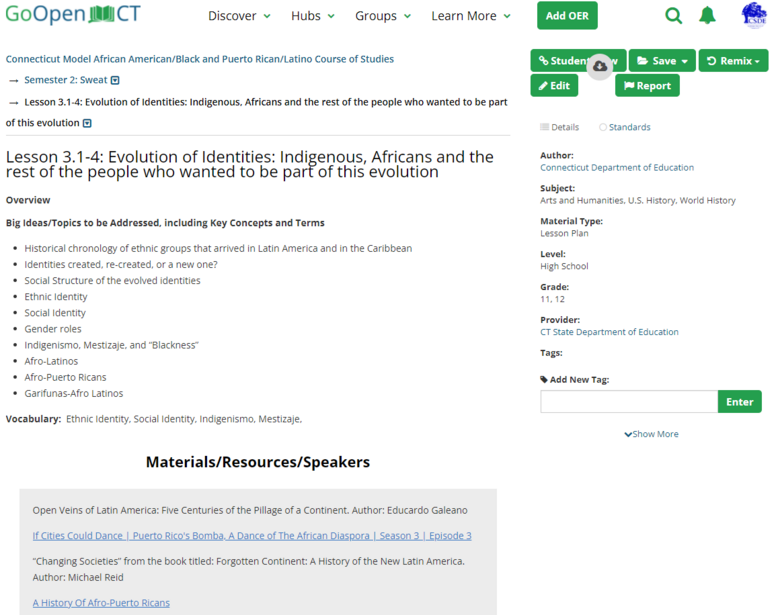Lesson 3.1-4: Evolution of Identities: Indigenous, Africans and the rest of the people who wanted to be part of this evolution

Overview
Big Ideas/Topics to be Addressed, including Key Concepts and Terms
Historical chronology of ethnic groups that arrived in Latin America and in the Caribbean
Identities created, re-created, or a new one?
Social Structure of the evolved identities
Ethnic Identity
Social Identity
Gender roles
Indigenismo, Mestizaje, and “Blackness”
Afro-Latinos
Afro-Puerto Ricans
Garifunas-Afro Latinos
Vocabulary: Ethnic Identity, Social Identity, Indigenismo, Mestizaje,
Materials/Resources/Speakers
Open Veins of Latin America: Five Centuries of the Pillage of a Continent. Author: Educardo Galeano
If Cities Could Dance | Puerto Rico's Bomba, A Dance of The African Diaspora | Season 3 | Episode 3
“Changing Societies” from the book titled: Forgotten Continent: A History of the New Latin America. Author: Michael Reid
A History Of Afro-Puerto Ricans
Calle 13 - Latinoamérica (NEW English Subtitles)
Afro-Latino: A deeply rooted identity among U.S. Hispanics
Afro-Latinos Get PhotoShopped Into Latin American Beauty Standards
The fascinating history and evolution of Afro-Puerto Ricans
The fascinating history and evolution of Afro-Puerto Ricans
ON OUR LAND: BEING GARIFUNA IN HONDURAS
NPR Podcast “Garifuna: A U.S.-Honduran Story” (18 minutes):
When Worlds Collide | sistema de castas | PBS
And yo grandma, where she at? Embracing Black Puerto-Rican Heritage
Social structure of Colonial Latin America
Book review of Living in Silverado: Secret Jews in the Silver Mining Towns of Colonial Mexico. Albuquerque: University of New Mexico Press, 2019. Author of Book: David Glitz. Review by Rafaela Acevedo-Field.
Alejandro Portes and Kelly Hoffman. "Latin American Class Structures: Their Composition and Change during the Neoliberal Era." Latin American Research Review 38, no. 1 (February 2003): 41-82.
Scott, Joan W. "Gender: A Useful Category of Historical Analysis." American Historical Review 91, no. 5 (December 1986): 1053-75.
Puerto Rico: Five Centuries of History by Francisco A. Scarano (2005)
Childs, Matt. “The Degrees of African Identity” in a book titled: Slaves, Subjects and Subversives: Blacks in Colonial Latin America. Albuquerque: University of New Mexico, pp. 209-245.
Race, Front, and Center: Perspectives of Race among Puerto Ricans (2017), Edited by Carlos Vargas-Ramos
Recommended Learning Activities, including UDL Principles/Scaffolded Supports and Asynchronous and Synchronous Learning Opportunities
Day 1
Initiation: Teacher starts with a mini-lesson on the evolution of multiple identities. Ensure that students understand the meaning of Ethnic Identity and Social Identity.
Activity: Students choose from the following to write reflection:
Calle 13’s Latinoamerica music video
Poem: And yo grandma, where is she at? Embracing Black Puerto-Rican Heritage
Poem: Ay, Ay, Ay de la Grifa Negra
Poem: Latino-Americanos: The Children of an Oscuro Pasado
Reflection Questions:
What do you think the poem means?
What intrigues you about the poem, video, or song?
Were you surprised by anything?
Did the song/video/poem remind you of any personal experiences?
What does the poem/song/video say about identity?
Closing/Evidence of Learning: Students write their own Identity Poem Project. Teacher reviews directions with students and shares a personal example of a poem with the class.
Day 2
Initiation: Discuss with students their beliefs about beauty standards based on race. Watch Afro-Latinos Get PhotoShopped Into Latin American Beauty Standards and have students post about how they relate to “normalized beauty standards.”
Review some of the student reflections and then have them watch/listen to “Afro-Latina” performed by Elizabeth Acevedo at Afro-Latina | Learning for Justice. Discuss: What do you think Elizabeth Acevedo is attempting to do (e.g., educate, create a mood)? What connections are there to history learned so far? What personal connections do they make?
Activity: Dive specifically into a group of Afro-Latinos from Honduras called the Garifuna. Students choose between watching a short documentary or podcast to gather information and complete analysis: Garifuna Activity
Closing: Discuss with students the assumptions and biases that might exist around Afro-Latinos, Afro-Puerto Ricans and “beauty standards,” and how these assumptions affect racial, ethnic and socio-economic identity of Puerto Ricans and Latinos.
Options for Content Continuity Across History Courses and Interdisciplinary Integration
Humanities
English
Anthropology
Economics
Extensions/Experiential Opportunities
Students read Poem: Child of the Americas by Aurora Levins Morales - Stephanie Youssef's Poetry Page by Aurora Morales-Levins and identify connections between the poem and the social-historical context in which it was written. Students can create their own Child of the Americas Poem and present it orally in class or in a recorded video